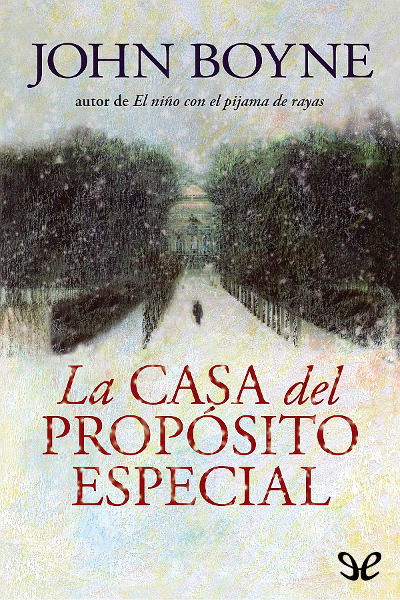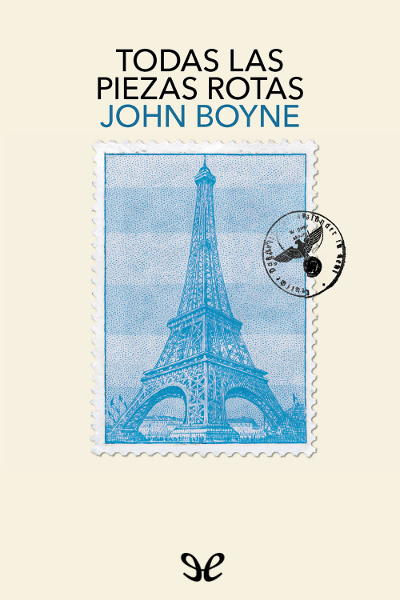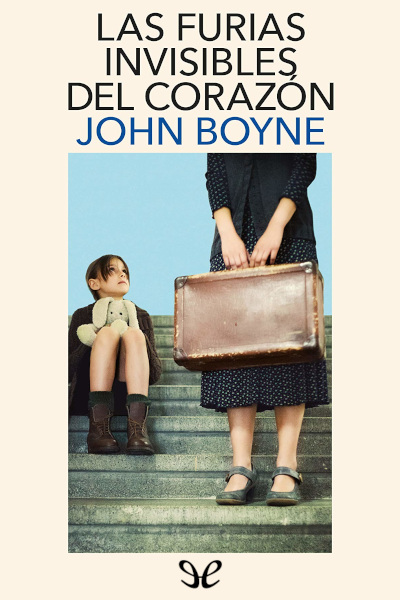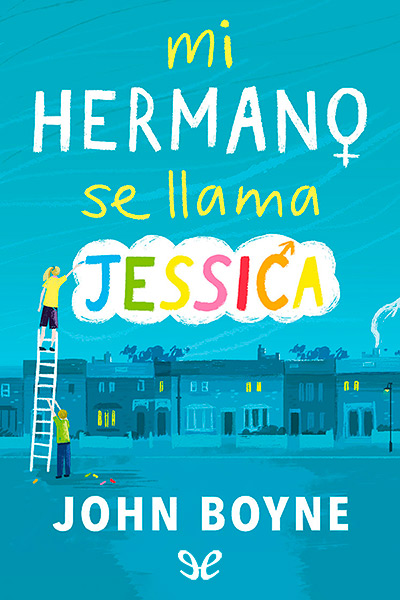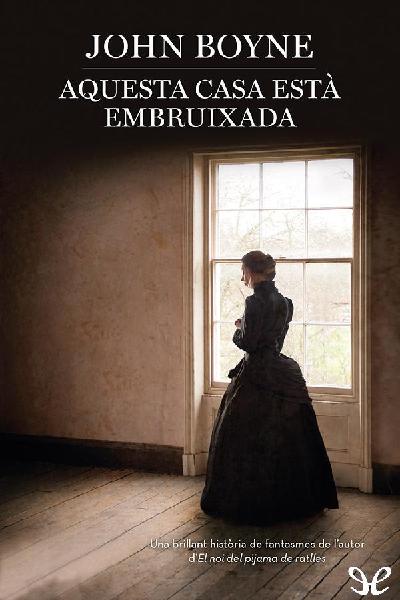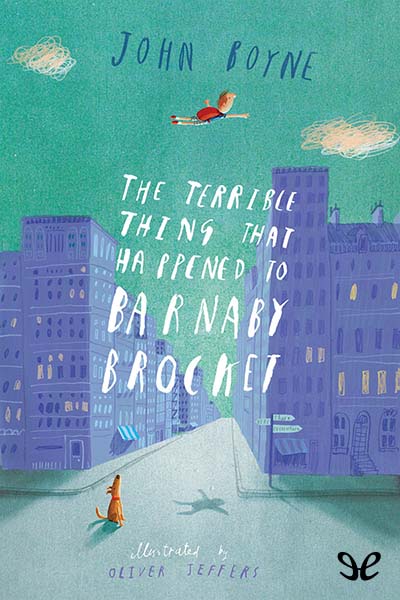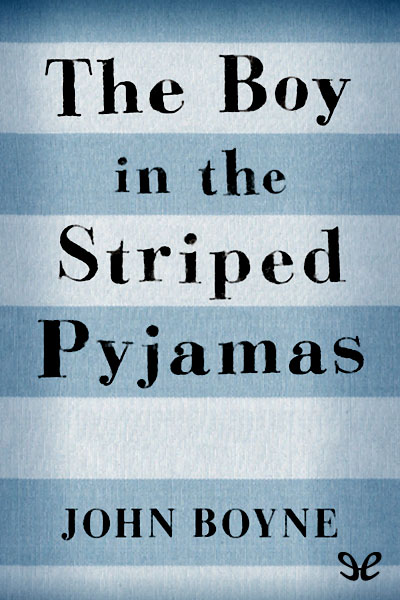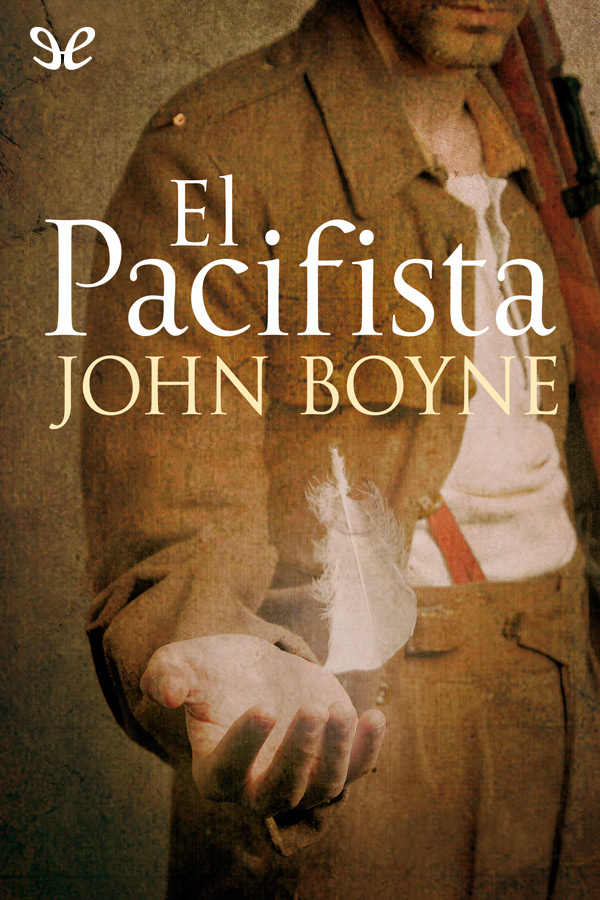oleebook.com
El noi del pijama de ratlles de John Boyne
de John Boyne - Género: Drama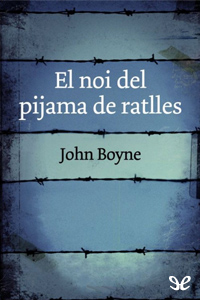
Sinopsis
Berlín, 1942. La guerra no afecta gaire la vida de Bruno, un noi de nou anys que viu en un barri residencial. Però un bon dia arriba a casa i es troba totes les coses empaquetades: el seu pare, membre de lelit militar, ha rebut un nou destí i es veu obligat a marxar i instal·lar-se amb tota la família en una àrea rural mig deserta i molt depriment. Bruno savorreix i passa els dies obsessionat amb una tanca que salça davant la finestra de la seva habitació. Fins que no coneix Shmuel, el noi del pijama de ratlles, que viu a laltra banda del filferro espinós, Bruno ni tan sol no comprèn que ja no és a Alemanya sinó a Polònia. Tampoc no és conscient del que passa a la vida de Shmuel fins que és massa tard per escapar els horrors que es viuen a laltre costat de la tanca.
Lhonestedat narrativa, la congruència dels personatges i la progressió magistral de la trama, doten aquesta novel·la duna qualitat literària molt humana i duna força narrativa captivadora.
Libros Recomendados - Relacionados
Reseñas Varias sobre este libro
As Michael Kors once sighed to a clueless designer on Project Runway: Where do I start?
Let's open with some descriptive words that sum up this book, and I will then go on to explain them in further detail: Patronizing. Insipid. Smarmy. Just plain bad.
Patronizing: I believe that to write good children's literature, you have to think that children are intelligent, capable human beings who are worth writing for - Stephen King, who probably thinks kids are smarter than adults. The author of The Boy in the Striped Pajamas, on the other hand, clearly thinks that children are idiots. The main character, Bruno, is supposed to be nine years old, but compared to him Danny Torrance of The Shining (who was six) looks a Mensa member. There's child naivety, and then there's Bruno, who is so stunningly unobservant and unperceptive that I actually started to wonder if he was supposed to be mentally deficient somehow. And he's not the only child who receives Boyne's withering scorn and condescension. Take this scene between Bruno and his sister Gretel, when they've just moved to their house at "Out-With" (as Bruno insists on calling it, despite being corrected many times and seeing the name written down) and are wondering how long they're going to stay there. Bruno's father, a commandant in charge of the camp, has told the kids that they'll be there "for the foreseeable future" and Bruno doesn't know what that means.
"'It means weeks from now,' Gretel said with an intelligent nod of her head. 'Perhaps as long as three.'"
Gretel is twelve years old, by the way. TWELVE. See what I meant about Boyne thinking kids are morons?
Insipid And Smarmy: this book was not meant for kids to read. It's meant for adults who know about the Holocaust already, so they can read it and sigh over the precious innocent widdle children's adorable misunderstanding of the horrible events surrounding them and how they still remain innocent and uuuuuuggggggghhhhh. There's a scene towards the end, where Bruno puts on a pair of the "striped pajamas" so he can visit his friend on the other side of the fence. Bruno has had lice, so his head is shaved. When he puts on the pajamas, the Jewish boy observes him and the narration commits the following Hallmark-worthy atrocity: "If it wasn't for the fact that Bruno was nowhere near as skinny as the boys on his side of the fence, and not quite so pale either, it would have been difficult to tell them apart. It was almost (Shmuel thought) as if they were all exactly the same really."
YES JOHN BOYNE I SEE WHAT YOU DID THERE.
Just Plain Bad: This book is, technically, historic fiction, but I'm not putting it on my history shelf, because there is nothing historical in this book. Bruno is supposed to have grown up in Nazi Germany, the son of a high ranking SS officer, but based on his knowledge of everything, he's spent his entire nine years sitting inside with his eyes shut humming loudly while covering his ears. Okay, I get that he wouldn't know about the concentration camps - hardly anyone did at that point. But there are other things: Bruno consistently (and adorably!) mispronounces the Fuhrer as "the Fury" (I SEE WHAT YOU DID THERE JOHN BOYNE), and doesn't recognize the following key words and phrases: Jews, Fatherland, Heil Hitler. What. The fuck. Okay, so maybe this kid's too young to be in Hitler Youth (his sister isn't though, but for some reason she's not in it either), but come on - he thinks "Heil Hitler" is just a polite way to end a conversation. A nine-year-old boy growing up in a military household in Nazi Germany doesn't know what Heil Hitler means.
All of this comes back to my original thesis: John Boyne thinks that children are idiots.
Look, Boyne: just because you don't understand anything (history, children, good writing) doesn't mean the rest of us are quite so useless. Go cash your checks for that awful movie adaptation they did of this book and never try to make a statement about anything ever again, please.
Read for: Social Justice in Young Adult Literatureassigned-reading kids-and-young-adult the-movie-is-better ...more863 s5 comments BrandyAuthor 1 book127
I hardly know where to begin bashing this book. Do I start with the 9-year-old boy and his 12-year-old sister, who read about 6 and 8, respectively? The imperial measurements (miles, feet) despite the German setting? The German boy, raised in Berlin, who thinks that Der Führer is "The Fury" and Auschwitz is "Out-With," despite being corrected several times and seeing it written down? The other English-language idioms and mis-hearings, despite our being told that he speaks only German? And that he believes that "Heil Hitler!" is a fancy word for hello, because he understands neither "Heil" nor "Hitler"?
So maybe these are fussy issues, and I shouldn't trash the book on these minor linguistic flaws. Instead, I can start with the plot holes big enough to drive a truck through: that Bruno, whose father is a high-ranking official in "The Fury"'s regime, doesn't know what a Jew is, or that he's living next door to a concentration camp. Or that the people wearing the "striped pajamas" are being killed, and THAT's why they don't get up after the soldiers stand close to them and there are sounds " gunshots." Or that there's a section of fence that is (a) unpatrolled and (b) can be lifted from the ground high enough to pass food and, eventually, a small boy through, AND that nobody would try to get OUT through this hole. Or that Bruno's friend Shmuel, a frail 9-year-old boy, would survive over a year in a Nazi camp. Or even the author's refusal to ever use the word "Auschwitz," in an effort to "make this book about any camp, to add a universality to Bruno's experience."
That last is from an interview with the author that appears at the end of the audio version. I can't speak to most of what he said, because it was a lot of "here are all the places that are hyping my book," but the worst part of it, to me, was where he was addressing criticisms: "there are people who complain that Bruno is too innocent, too naive, and they are trivializing the message of this book." Um, no. I'm not trivializing the message; I'm objecting to his trivializing of the Holocaust. I find his treatment of the Holocaust to be superficial, misleading, and even offensive.
As an audio recording, I'm pretty neutral. The narrator did the best he could with the material and there was some differentiation between the characters' voices, but the music that was added... some chapters ended with appropriately-somber music. Other chapters had no music at all. Sometimes the music appeared in the middle of a chapter.
Two other incidental notes: first, normally you can't say anything negative about a Holocaust-themed book without being an asshole, because the books are so tied in with the Holocaust itself. In this case, though, I feel , due to the fictionalizing of it, the book is far enough removed from Auschwitz that it's okay to be negative about the book without being insensitive about the Holocaust. Second, this doesn't land on my "run away! Save yourself!" shelf, because that's more for books that are comically bad--books that I can bash with glee and mock with abandon. I can't find anything funny about what makes this book so bad; it's just plain offensive and shallow. 2007reads audiobooks historical ...more1,609 s2 comments PeterAuthor 1 book96
"The Boy in the Striped Pajamas" would easily top my list of "Worst Books about the Holocaust."
I am writing as one who was there -- I was once myself a boy in striped pajamas and am a survivor of six German concentration camps. This book is so ignorant of historical facts about concentration camps that it kicks the history of the Holocaust right in the teeth.
John Boyne's premise is that the nine-year old son of the commandant of Auschwitz, bored with his isolated life, takes walks to the fence surrounding this infamous camp and meets there a nine-year old inmate who is on the other side of the fence. The two boys become friends and continue meeting on a daily basis.
Here is some news for Mr. Boyne. The 10-ft high barbed wire fence surrounding each camp was electrified. Touch if once and you are fried. There was a no-man's land on each side of the fence; along the inside perimeter of the fence were guard towers; each tower was manned by an armed guard around the clock; each guard was responsible for one segment of the fence within his vision; it was his duty to prevent anyone from approaching the fence, either from the inside, or from the outside; he was under orders to shoot anyone he saw approaching the no-man's-land.
In addition, along the outside perimeter, prominent signs proclaimed, "STOP - Danger - High-Voltage Electricity." So that even a dense nine-year-old would get the message, a skull and cross-bones were pictured at the top of each sign.
Let me add this. A nine-year-old boy arriving in Auschwitz-Birkenau on a cattle train would take only a single walk in this camp: from the train to the gas chamber.
"The Boy in The Striped Pajamas" makes a mockery of these very basic facts. It is a fantasy that does untold damage to the cause of truth about the Holocaust. This book has only one purpose: to make a lot of money for the author and the publisher. And this purpose it accomplishes. The publisher recently proudly trumpeted in an ad in the New York Times: over one-million copies sold and still going strong. And that's not even counting the profits from the revolting movie based on this book.
Peter Kubicek
Author of "MEMORIES OF EVIL" -- a factual book about the Holocaust that will never make it on any list of best books about the Holocaust because my book tells it the way it was: there was nothing cute, nothing in any way benign about the concentration camps. These camps were about brutality, starvation, and sheer terror.2,295 s Hailey (Hailey in Bookland)614 85.7k
3.5*
I didn't love this, but I did appreciate the fact that it had a very powerful message (and an ending I wasn't expecting at all). My feelings were definitely changed by the fact that the author describes the story as a fable. The abstractness makes a lot more sense in that way. Definitely an unforgettable read, nonetheless!historical-fiction owned644 s1 comment Federico DN744 2,042
Two innocent boys, and two very different worlds, separated by a not so infallible fence.
Berlin 1942, middle of WWII, beginnings of the Holocaust. Bruno is a little boy of barely nine years old, son of a very well standing german family. His life passes relatively uneventful until one day his father is appointed commander in a faraway region. Bruno, his sister Gretel and his parents are compelled to relocate to Out-With, to a much smaller house, forsaking family and friends, and sacrificing everything for the important rank promotion.
In this new house isolated from the rest of the world, Bruno finds a small window that allows him to see at the distance an incredibly large area with tiny little huts; and an endless number of tiny little figures dressed in a curious striped outfit. Mature, old people... and children. In a huge wire fenced field.
A superb holocaust historical fiction, and a must read alongside the Diary of Anne Frank. Two unique and different perspectives of a same tragedy. A novel about the cruelties of war, and the self invented differences that lead humanity to separate itself. So very powerful. Heartbreaking and painful as few others. Highly recommendable!
*** Still remaining, the movie (2008).
-----------------------------------------------
PERSONAL NOTE :
[2006] [240p] [Historical] [Highly Recommendable] [Curious Bruno] [Innocent Shmuel] [Ending Alert] [Oh, the humanity!]
-----------------------------------------------
Dos niños inocente, y dos mundos muy diferentes, separados por un no tan infalible alambrado.
Berlín 1942, mediados de la segunda guerra mundial, principios del Holocausto. Bruno es un pequeño nene de escasos nueve años, hijo de una familia alemana de buen pasar. Su vida transcurre sin mayores problemas hasta que un día su padre es designado comandante en una región lejana. Bruno, su hermana Gretel y sus padres se ven obligados a reubicarse en Out-With a una casa más pequeña, abandonando familia y amigos en sacrificio de la importante promoción laboral.
En esta nueva casa aislada del mundo, Bruno encuentra una pequeña ventana que permite entrever a la distancia una enorme cantidad de pequeñas chozas; y un sinfin de pequeñas figuras vistiendo un curioso uniforme de rayas. Gente adulta, mayor... y niños. En un enorme campo alambrado.
Una sobresaliente novela histórica de ficci?ón del Holocausto, y un deber para leer junto a el Diario de Ana Frank. Dos perspectivas únicas y diferentes de una misma tragedia. Una novela sobre las crueldades de la guerra, y sobre las diferencias autoinventadas que llegan a separar la humanidad a sí misma. Muy poderosa. Directa al corazón y dolosoa como pocas otras. Muy recomendable!
*** Queda pendiente, la película (2008).
-----------------------------------------------
NOTA PERSONAL :
[2006] [240p] [Histórica] [Altamente Recomendable] [Curioso Bruno] [Inocente Shmuel] [Alerta de Final] [Oh, la humanidad!]
-----------------------------------------------adapted favorites historical413 s4 comments Wayne485 146
I seriously suggest you read about what happened to real children in the Holocaust. It won't fill your thoughts for many days or shock you; rather it will fill your LIFE and make you feel sick to the core of your being.
Paul Friedlander, himself a survivor, recounts in his recent highly praised book the incident of 90 Jewish infants all under the age of five, orphaned after their parents were murdered in a mass shooting.
These children were subjected to indescribable mistreatment for days.
Then they were individually hanged.
I read this with horror, revulsion and total disbelief.
(ref.The Years of Extermination: Nazi Germany and the Jews, 1939 - 1945)
Or the incident of the young German soldier participating in the evacuation of the patients in the hospital in the Warsaw Ghetto. In the presence of a distraught Jewish crowd of relatives and onlookers, patients were being thrown onto the backs of trucks.The babies were being thrown from the upper windows. The soldier requested and was given permission to catch the falling babies on his bayonet.
(ref. The Holocaust - the Jewish Tragedy by Martin Gilbert.
ISBN 0 00 637194 9 )
There are so many historical inaccuracies and ludicrous details in this totally implausible story of Boyne's eg. Bruno's ignorance of basics, impossible when he would have been in the Hitler Youth and the Nazi education system.This travesty of the Holocaust is called a 'fable' as if with all its faults, it has special claim on some gravitas, thus giving Boyne justification for this lame expose of racism.
I was a member of the Jewish Holocaust Committee here in Sydney for a while and once had to endure a young rabbi lecturing on how the Holocaust was God's punishment on the Jews. So there are fools to be found inside the club as well as outside it.
Not a single pure ethnic German child entered a gas chamber as part of the extermination of the Jews...although many died in Germany as part of the
pre-war killing of disabled and retarded children.When protests brought this program to a close the same staff were later sent to operate the gas chambers in the camps.
And for six million Jewish men, women and children there was no saviour.
This bitter pill is too much for some people to swallow.
Some, the young rabbi, takes refuge in blaming the very victims;
others find refuge in sentimental fiction such as Boyne's which does no honour to these tragic, lost people. And today there are perverse forces abroad, from renowned historians to Catholic bishops, who would deny that the Holocaust ever took place or to an extraordinary lesser degree.They use every discrepancy of detail as well as lies to justify their denial. So for anyone touching on this subject it is vital and morally incumbent on them to GET THE FACTS RIGHT.
There is an overwhelming library of rivetting, emotional, inspiring and tragic Holocaust stories out there - all factual, which you may have already plunged into. Boyne may even have led you there. But finally Boyne just deserves to fade away.
P.S.The Oscar winning Foreign Language film of 1997, "Life is Beautiful", was also, not surprisingly, referred to as a 'fable'. It also is an implausible piece of Holocaust sentimentality and a stampede away from having to swallow the bitter pill of reality.
books-i-ve-thrown-across-the-room the-holocaust388 s Rowan150 467
When I saw the film version at the cinema, the entire audience remained in their seats and sobbed into tissues as the credits rolled. Ive never experienced anything it since. With John Boyne finally releasing a much-anticipated sequel, I figured it was about time I read this!
The Boy in the Striped Pajamas is a simple, yet powerful fable- story. It was a quick read, but one that will remain with me, and one which Im still thinking about. This is definitely a book that pulls at the heartstrings. A lump in the throat accompanied my reading for a large portion, particularly the end.
John Boyne succeeded in making me view the world through the eyes of a naïve, but curious and inquisitive nine-year-old again. He repeated numerous phrases and sentences throughout, some such as Out-With and The Fury, adding childhood innocence to words that stand for anything but. The book certainly picked up once Bruno (the main character) befriended Shmuel (a boy in striped pajamas that lived over the fence).
Bruno was sure that he had never seen a skinnier or sadder boy in his life but decided that he had better talk to him.
Boyne created tension well; most notably the kitchen scene featuring Shmuel, Bruno and the evil Lieutenant Kotler. It was anxiety-inducing and a sense of foreboding grew throughout the book. My heart ached whenever the s of Shmuel or Pavel were mentioned. I couldnt help but wonder about the back story of Pavel in particular.
Dont make it worse by thinking its more painful than it actually is.
Despite having seen the film, there were enough small differences to keep things interesting most notably a head shaving scene and the ending. I actually thought the film ending was more powerful and emotional than the book's, which despite also packing a punch, tapered off in comparison.
There are plenty of historical inaccuracies, yes, but this is fiction after all, and aimed at younger readers. If this book acts as a stepping stone into learning about the Holocaust more fully, then that will always be a good thing.
The Boy in the Striped Pajamas is a book that I wish was around during my school years. Boyne has crafted an intelligent, yet simple story whose use of metaphors and various themes cause the reader to pause and reflect. Books this are relevant more than ever. Im keen to read the sequel.
It was almost (Shmuel thought) as if they were all exactly the same really.362 s Cecily1,194 4,589
A powerful concept, but very poorly written (even allowing for the young adult target audience) - and one of a tiny number of books I can think of that was better in the film version.
Plot
Bruno is 9 and lives in Berlin in 1943 with his parents and 12 year old sister. They are wealthy and his father is an important soldier who is promoted to be the Commandant at Auschwitz. The trick of the story is that Bruno doesn't realise the horror of what goes on behind the barbed wire, where everyone wears striped pyjamas, even when he befriends a boy of the same age at a corner of the camp.
Although his father can be strict and distant, Bruno is unfailing in his trust in the goodness of his father. In the film, there was at least a gradual, if reluctant, dawning of doubt about his father and all he stood for, but that doesn't happen in the book; the themes of family, friendship and trust are barely touched on.
Implausible Ignorance
The main problem is that it's told from Bruno's viewpoint, and he is ridiculously naive and ignorant for the son of a senior Nazi.
Not knowing, and not wanting to know, the horror of what was happening is entirely understandable (especially when a parent is involved).
However, he hasn't heard of "the Fatherland", thinks the Fuhrer is called The Fury (throughout), that Auschwitz is called "Out With" and that "Heil Hitler" means "goodbye"! Yet we're meant to believe that he's the 9 year old son of a senior Nazi! His father had clearly been neglecting his duty to train the next generation of Hitler youth.
And anyway, the puns wouldn't work in German.
What is even more insulting to readers is that Boyne has responded to this widespread point of criticism by saying that anyone who thinks the boy is too naive is denying the holocaust! (See Kelly H. (Maybedog) comment on Oct 02, 2012 and subsequent ones).
Other Flaws
* Surely some aspects of Schmuel's plight would have been glaringly obvious (emaciated, shorn hair, possibly lice-ridden, ragged clothes etc)?
* There are several stock phrases that are trotted out annoyingly often ("a Hopeless Case", "mouth in the shape of an O", "if he was honest as he always tried to be").
* They talk of miles not kilometres and feet not centimetres, which might not matter were the rest of it more realistic.
* Just occasionally, and completely out of character, Bruno talks in an unnaturally adult way ("If you ask me we're all in the same boat. And it's leaking", and a nasty person who "always looked as if he wanted to cut someone out of his will").
It might have worked better if Bruno had been 5 or 6, but I suppose the target audience would have been less willing to read it, so the result is a book that isn't really suitable for any age group. What a waste.
Postscript 1
Arising from Kelly Hawkins' review:
Boyne says:
I think the most frequent criticism of the book in the years since its been published is that Bruno is too naive. People say: Hes verging on the stupid how could he not know? For all the criticisms you can make, I always feel thats the wrong one because hes grown up in a house with his father wearing a uniform, so I always think why would be question it? There wouldnt be any motivation for him to suddenly turn around if your father came home wearing a doctors uniform every day, you wouldnt turn around one day and ask: Why are you wearing that?
So, Bruno is kind of representing that blindness, in a way. When he goes to the fence, and when he asks that question, he is kind of representing the rest of us who are trying to understand the Holocaust and find some answers to it. Also, when the camps were liberated, the world was surprised through 1945 and 1946. The majority of the Holocaust had taken place over four years and, granted, it was a different information age but I still maintain that in those sorts of movies, the naivety is appropriate. Its based on real life.
From: http://www.indielondon.co.uk/Books-Re...
Elsewhere, he is quoted as saying that naivety and complacency were two of the main reasons the Holocaust occurred (http://ya.wikispaces.com/The+B...).
I find that a very unsatisfying defence. It answers why people don't want to know the horrors (which I fully acknowledge), but does not begin to tackle Bruno's specific ignorance of common words related to the Third Reich.
Postscript 2, October 2015
His new book has a similar title and another Nazi theme - with Hitler himself this time: The Boy at the Top of the Mountain. I won't be reading that, but I suspect it will cause similar controversy.
Postscript 3
See this excellent review by a survivor of Nazi concentration camps. Boyne (posting as John) responded to some of the criticisms:
https://www.goodreads.com/review/show...
Postscript 4, 14 May 2017
In today's Sunday Times, the Prime Minister Theresa May was asked by a 19-year old in her constituency, "Has your thinking ever changed because of a novel?"
She replied:
"A book that brought something home to me was The Boy in the Striped Pyjamas. It is a very, very cleverly written book and a very well-written book, and what it brings home is the absolute horror of the Holocaust."
Hmmm.avoid film-good-or-better-than-book historical-fict-20th-cent ...more271 s Reading_ Tamishly4,935 3,041
"When he closed his eyes, everything around him just felt empty and cold, as if he was in the loneliest place in the world. The middle of nowhere."
*May 2021 Re-read
One of the worst fictional sister characters. Gretel, you're really annoying. Exactly a Hopeless Case.
Maria's character is memorable. She's grateful and I really appreciate such characters in stories.
But you know the most memorable character in the entire story is? The one who peels potatoes. Pavel. I will always have a soft spot for this character.
The complicated father character is something I want to learn more about.
And another most hateful fictional character ever? Don't let me talk about Lieutenant Kotler. Apart from the highly hateful behaviour, I do not forgive someone who are cruel towards animals. Can he just disappear in my next reread? I just cannot stand this character.
Real easy to start and finish in one sitting.
This was a really good read. I couldn't help getting images of the movie adaptation that I have watched a long time ago.
I loved everything about this book.
I loved the fact that this book made me love some of the characters so much as well as hate a few hateful characters to the core.
I thought this book would make me cry buckets and buckets but I didn't.
Actually it clutched my whole being. And I just had to keep on reading it till the last page as I couldn't stop reading it.
Yes, it is this interesting.
The characters were so alive and unique on their own.
Bruno and Shmuel. Your innocence and friendship will be etched forever in my soul.
One of my most favourite classics so far.
Planning to read more John Boyne
Autor del comentario:
=================================


